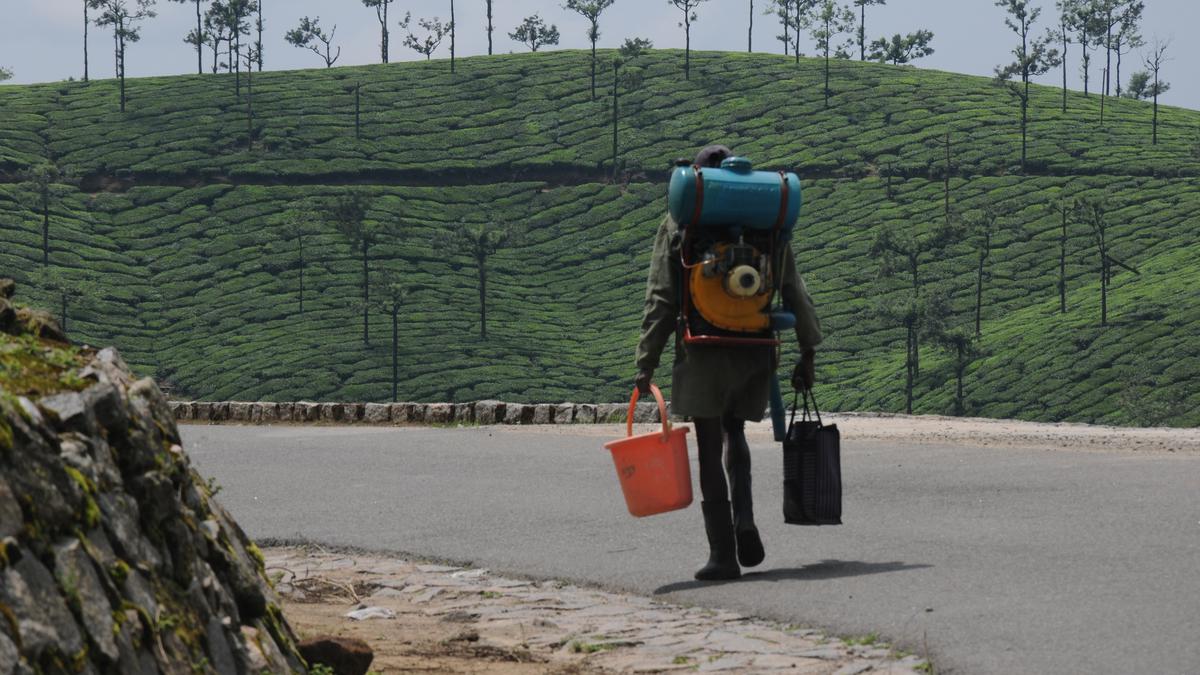Annual crop loss of 147 million kg due to pest attacks: Tea research body

File picture of a plantation worker carrying equipment to spray pesticides in a tea plantation in Tamil Nadu.
| Photo Credit: K. K. Mustafah
Amid rising temperatures and prolonged rainless periods due to climate change, large-scale attacks of pests and diseases in tea plantations across the country have become worrisome for planters with an estimated annual crop loss of around 147 million kg, an industry body said on Saturday.
Tea Research Association, in its statement, said the revenue loss due to pest infestation in tea plantations is pegged at ₹2,865 crore per year.
“Pest and diseases were present earlier, but it has aggravated over the last few years. In north India, the incidence of pest attacks was initially limited to a few areas in Dooars in West Bengal and the south bank of Assam, but has been spreading rapidly in other tea-growing regions of Cachar, Tripura, Arunachal Pradesh, Darjeeling and Terai over the last two decades,” TRA secretary Joydeep Phukan said.
The major pests prevalent in north Indian tea plantations are tea mosquito bugs and looper caterpillars apart from thrips.
There has been also a growing incidence and spread of termite infestation in northeast India, which is spreading to new areas, the TRA official said.
The cost of plant protection in tea plantations in the northern part of West Bengal and the northeast region of the country has increased manifold over the past two decades, reaching as high as ₹25,000 to ₹30,000 per hectare, the statement said.
According to TRA, this has had a “negative impact on the viability of operations” leading to lower exports and global competitiveness.
“Crop loss due to pest infestation in tea is estimated at 147 million kg per year, and in revenue, the loss is around ₹2,865 crore per year,” Mr. Phukan said.
The tea industry uses pesticides which are approved by the Central Insecticides Board along with the guidelines issued by the Tea Board India through its Plant Protection Code and Good Agricultural Practices listed by the TRA.
“Currently, there are only seven pesticides which are approved for use in India by CIBRC (Central Insecticides Board & Registration Committee), making it difficult for tea growers to effectively control tea mosquito bugs and tea loopers,” the industry body said.
The availability of a “narrow range of limited chemicals has led to resistance build-up in pest populations”, Mr. Phukan said, adding that there are “restrictions on the use of pesticides in tea due to revision of MRLs (maximum residue levels) in the EU”.
Plant protection scientists at TRA have been evaluating several new molecules/ pesticides against the major pests through products available with Indian pesticide manufacturers and have submitted bio-efficacy and residue studies to the CIB&RC, he claimed.
“Considering the huge crop loss due to tea mosquito bug and other major pests, the TRA, which is a public authority under the Department of Commerce, has requested the agriculture secretary to kindly intervene for allowing provisional approval under national exigency of some more pesticides for two years for the benefit of the tea growers,” Mr. Phukan added.
For all the latest business News Click Here

